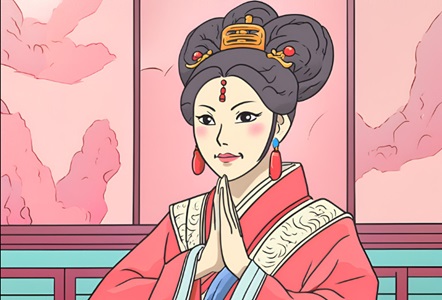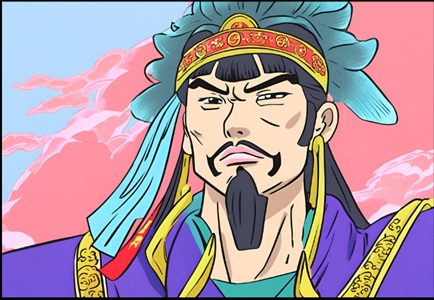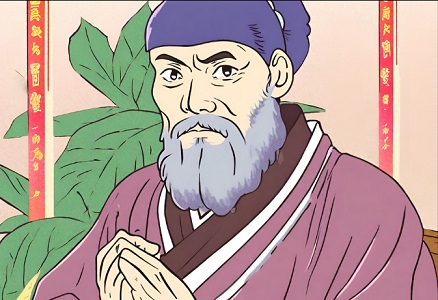Title of Biography in Chinese, Pinyin: 李白传 (Lǐ bái Zhuàn).
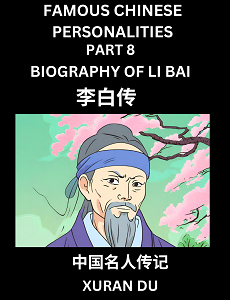
Title of Biography in English: The Biography of Li Bai.
Check out books on my Amazon and Barnes & Noble homepages as well as the following pages to learn Biographies of famous Chinese personalities-
- Part 1 – Chinese Biography Book Series for Beginners
- Part 2 – Chinese Biography Book Series for Beginners
- Part 3 – Chinese Biography Book Series for Beginners
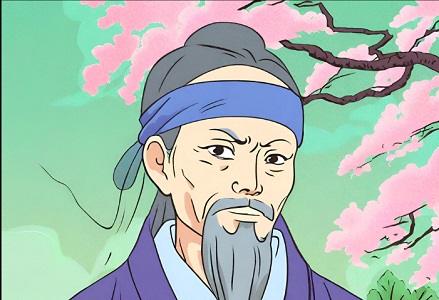
The Biography of Li Bai in English (英文传记)
Li Bai: The Legendary Life of the Poet Immortal
Li Bai, styled Taibai and known as the Qinglian Hermit, was a great romantic poet of the Tang Dynasty, renowned as the “Poet Immortal.” He possessed exceptional talents and a bold, uninhibited personality, and his works were filled with romanticism, exerting profound influence on later generations.

Born in the heyday of the Tang Dynasty, Li Bai was intelligent and literate from an early age. His poetry covered a wide range of topics, including songs of praise for the magnificent scenery of the motherland and expressions of his personal aspirations and ambitions. His poetry was fluent and natural in language, profound in meaning, and rich in musicality and imagery, earning him the praise of “painting in poetry and poetry in painting.”
Li Bai traveled extensively throughout his life, visiting places both north and south of the Yangtze River. He loved nature and pursued freedom, drinking and singing with friends, leaving behind many beloved works. However, his official career was not smooth, and he was demoted several times, but this did not affect his passion for poetry and freedom.
In poetic creation, Li Bai possessed a unique artistic style. He was adept at using rhetorical devices such as exaggeration and metaphor to express his profound insights into nature, life, and society. His poetry was filled with passion and strength, revealing his bold and uninhibited personality and his pursuit of freedom.
The life of Li Bai was filled with legendary color. His poetry and personal charm made him a brilliant star in the history of Chinese literature, exerting a profound influence on later generations.
Learn Biography Of Li Bai in Chinese (中文传记)

李白,字太白,号青莲居士,唐代伟大的浪漫主义诗人,被誉为“诗仙”。他才华横溢,性格豪放不羁,作品充满了浪漫主义色彩,对后世影响深远。
李白生于盛唐时期,自幼聪颖过人,喜好文学。他的诗歌题材广泛,既有歌颂祖国大好河山的壮丽诗篇,也有抒发个人豪情壮志的豪放之作。他的诗歌语言流畅自然,意境深远,富有音乐性和画面感,被誉为“诗中有画,画中有诗”。
李白一生游历四方,足迹遍布大江南北。他热爱自然,追求自由,与友人畅饮高歌,留下了许多脍炙人口的佳作。然而,他的仕途却并不顺利,曾数次被贬谪,但这并未影响他追求诗歌和自由的热情。
在诗歌创作上,李白有着独特的艺术风格。他善于运用夸张、比喻等修辞手法,表达出对自然、人生和社会的深刻感悟。他的诗歌充满了激情与力量,展现了他豪放不羁的性格和追求自由的精神。
李白的一生充满了传奇色彩。他的诗歌和人格魅力,使他成为了中国文学史上的璀璨明星,对后世产生了深远的影响。
Li Bai Biography Keywords- English, Chinese & Pinyin (关键词)

- 李白(Lǐ bái, Li Bai): A great romantic poet of the Tang Dynasty, renowned as the “Poet Immortal.”
- 诗仙(Shī xiān, Poet Immortal): A title given to Li Bai in recognition of his exceptional poetic talents and immortal-like literary achievements.
- 浪漫主义(Làngmàn zhǔyì, Romanticism): A literary and artistic movement emphasizing individualism, expression of emotion, and a return to nature, exemplified in Li Bai’s works.
- 仕途(Shìtú, Official Career): Li Bai’s political career, which was not smooth and included several demotions but did not dampen his pursuit of poetry and freedom.
Pinyin of Li Bai Biography (李白传记的拼音)

Lǐbái, zì tàibái, hào qīng lián jūshì, táng dài wěidà de làngmàn zhǔyì shīrén, bèi yù wèi “shī xiān”. Tā cáihuáhéngyì, xìnggé háofàng bùjī, zuòpǐn chōngmǎnle làngmàn zhǔyì sècǎi, duì hòushì yǐngxiǎng shēnyuǎn.
Lǐbái shēng yú shèng táng shíqí, zì yòu cōngyǐngguò rén, xǐhào wénxué. Tā de shīgē tícái guǎngfàn, jì yǒu gēsòng zǔguó dàhǎo héshān de zhuànglì shīpiān, yěyǒu shūfā gèrén háoqíng zhuàngzhì de háofàng zhī zuò. Tā de shīgē yǔyán liúchàng zìrán, yìjìng shēnyuǎn, fùyǒu yīnyuè xìng hé huàmiàn gǎn, bèi yù wèi “shī zhōng yǒu huà, huà zhōng yǒu shī”.
Lǐbái yīshēng yóulì sìfāng, zújì biànbù dàjiāngnánběi. Tā rè’ài zìrán, zhuīqiú zìyóu, yǔ yǒurén chàngyǐn gāogē, liú xiàle xǔduō kuàizhìrénkǒu de jiāzuò. Rán’ér, tā de shìtú què bìng bù shùnlì, céng shù cì bèi biǎnzhé, dàn zhè bìng wèi yǐngxiǎng tā zhuīqiú shīgē hé zìyóu de rèqíng.
Zài shīgē chuàngzuò shàng, lǐbái yǒuzhe dútè de yìshù fēnggé. Tā shànyú yùnyòng kuāzhāng, bǐyù děng xiūcí shǒufǎ, biǎodá chū duì zìrán, rénshēng hé shèhuì de shēnkè gǎnwù. Tā de shīgē chōngmǎnle jīqíng yǔ lìliàng, zhǎnxiànle tā háofàng bùjī dì xìnggé hé zhuīqiú zìyóu de jīngshén.

Lǐbái de yīshēng chōngmǎnle chuánqí sècǎi. Tā de shīgē hé réngé mèilì, shǐ tā chéngwéile zhōngguó wénxué shǐshàng de cuǐcàn míngxīng, duì hòushì chǎnshēngle shēnyuǎn de yǐngxiǎng.
